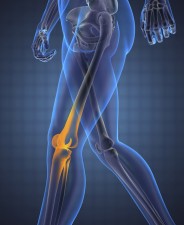 Glucosamine and chondroitin are found naturally in cartilage, and are popularly taken as dietary supplements to help OA. Indeed, the combination is among the most popular so-called dietary nutritional supplements consumed by Americans, with a market estimated at perhaps one-billion dollars annually.
Glucosamine and chondroitin are found naturally in cartilage, and are popularly taken as dietary supplements to help OA. Indeed, the combination is among the most popular so-called dietary nutritional supplements consumed by Americans, with a market estimated at perhaps one-billion dollars annually.
Now, a new study published in Arthritis & Rheumatology suggests that both dietary supplements do not significantly relieve pain or modify disease progression of knee OA. A multi-center group of researchers led by Dr. Shibing Yang, PhD, MS, of the Dept. of Epidemiology at Virginia Commonwealth University set out to estimate the effectiveness of glucosamine/chondroitin (G/C) in helping knee symptoms (including pain, stiffness, and function) and disease progression, measured radiologically, of the study subjects OA. Only participants not reporting use of glucosamine or chondroitin at baseline were included in the analyses. Cumulative exposure of G/C was calculated as the number of assessments when participants reported use. Two samples were identified: over 1,600 participants for analyses of symptoms, and over 1,100 for analyses of structural changes. The majority of the participants were women (almost 60 percent) and non-Hispanic white (almost 75 percent).
To measure pain, stiffness, and physical function, the WOMAC scale was used. Disease progression was analyzed by taking bilateral standing knee x-rays with patients knees flexed 20 to 30 degrees and feet rotated internally 10 degrees and measuring joint space width (JSW). During the study period, 18 percent of the participants initiated treatment with G/C. After adjusting for potential confounders (including sociodemographics, general health status, BMI, and use of other arthritis treatments), no clinically significant differences between users and never-users of the supplements were found in WOMAC pain, stiffness, function, or JSW at all annual assessments.
The authors noted limitations in their study, including the possibility that participants went on and off supplements between annual assessments and the lack of information on supplement formulation, dosage, and purity. But the findings of this study are consistent with some previous studies. We found that treatment with glucosamine/chondroitin for 3 years did not appear to bring about relief in symptoms or retardation of disease progression," concluded the authors.
ACSH s Dr. Gil Ross, who practiced internal medicine and rheumatology over the course of 20 years, had this comment: I witnessed many different remedies preferred by patients with various forms of arthritis. Very few were based on evidence acquired through controlled studies; most were of the folk varieties, including copper bracelets and eliminating deadly nightshades from the diet (that s largely tomatoes). Of course, supplements recommended by friends, family or the expert at the local healthfood store were also hugely popular. Glucosamine/chondroitin sulfate were quite popular, and indeed there were some studies showing potential benefit. But those have been pretty well debunked over the past decade, which is consistent with this new study. My advice: don t waste your time or money on the stuff.